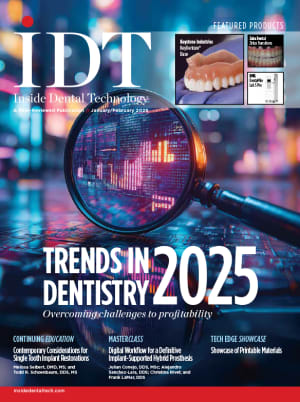Impact Technology 2020
Inside Dental Technology delivers updates on digital workflows, materials, lab techniques, and innovation in dental technology through expert articles and videos.
This industry, along with almost any other manufacturing industry in the world, is on a road of no return when it comes to the impact technology will bear on how goods are produced, services are rendered, and businesses are operated. Technology is no longer just a tool that adds efficiencies of scale to productivity, but for many has become a complex business strategy to drive growth. The difficulty for most business owners in the future will be keeping pace with the rapidity of new developments that continually disrupt and threaten operational competitiveness. And, even though there will always be a place for the exquisitely handcrafted, highly customized and high-priced end product, the reality of custom-made clothing, furniture, homes, and cars built to fit and satisfy individual tastes rest outside the capabilities of current technology for now and the financial reach of the majority.
It is not easy for business owners caught up and lost in the real world of their microcosm to look beyond borders to seek answers on what types of changes may be on the horizon. And often it is risky to rely on one’s individual perceptions. History is littered with examples of business leaders who guessed incorrectly and paid the price, often resulting in their company’s reduced market performance or complete market irrelevance.
A 2012 white paper report issued by The Economist Group’s independent business arm, the Economist Intelligence Unit (EIU), may provide insight on predicting the future impact of technology on business globally. Offering forecasting and advisory services through research and analysis on a variety of issues, the EIU has been servicing industries and individual clients for more than 60 years. The report, “Agent of Change: The Future of Technology Disruption in Business” (www.managementthinking.eiu.com/sites/default/files/downloads/EIU_Agent%20of%20change_WEB_FINAL.pdf), reviews the impact that technology developments will have over the next decade on various aspects of business, including organizational structures, jobs and the workplace, customer interactions, and business models. Although not specific to any one industry, many of the findings in the report will ring familiar. Predictions forecast in the report are listed below.
• Few industries will remain unchanged by technology disruption. Of the 500+ business executives interviewed, 60% believed their main vertical market will bear little resemblance in 2020 to how it looks today.
• “Big data” will become a business of its own. The ability to collect and analyze huge volumes of data will create new business models based on specialist analytics services.
• Mid-size companies will be less common in 2020. Advances in technology will allow micro-entrepreneurs to act like far larger businesses than they are, putting pressure on mid-size companies to grow in order to compete on scale or downsize to compete on speed.
• Job growth may be increasingly de-coupled from economic growth owing to automation. Technology advancements will threaten to displace a wide range of jobs but will also create many new occupations that today do not exist.
• As transactions are automated and collaboration becomes more virtual, the purpose of physical stores and offices will change. Just as banks have evolved into more consultative branches with the introduction of automated banking, so will other businesses that depend on the customer interface, separating production from the knowledge worker.
• The organization of 2020 will be more transparent than ever before. Firms will find it increasingly hard to hide poor service, high pricing, or unpopular practices as technology makes them more visible to the end consumer.
Have you been researching information on the future of business for the next decades and have unearthed articles of interest that may offer insight? If so, please share them with us, and we will post them on Facebook and our website (www.dentalaegis.com/idt).
